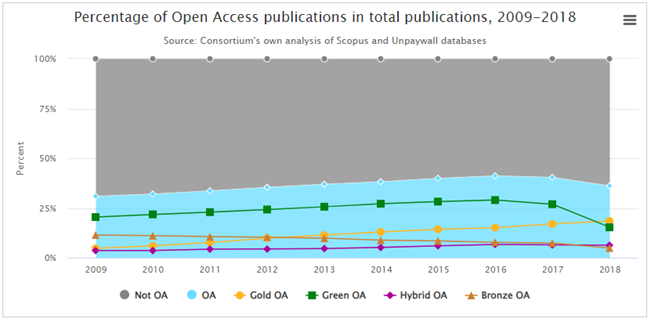
Despite calls for open access, 64% of scholarly publications still have research paper paywalls in place, says the European Commission of Research and Innovation, an official research organization of the European Union.1 This means that a vast majority of academic knowledge remains inaccessible without a paid individual or institutional subscription. Consider for a moment that you have found interesting new information in a journal that would add greatly to your research.
However, the article containing the information is hidden behind academic paywalls and the only way to access it is to buy a subscription (which can be quite expensive). Even if you do use your university’s log-in credentials, you may only be able to access journals that your organisation has a subscription to. These barriers to accessing the wealth of information available today can be really frustrating and limiting for researchers.

So the question is how to read paywall articles without subscribing to the journal or having to pay the usually hefty single-article fee? This article lists three ways in which one can access academic paywalled papers free of cost and in a legitimate manner.
1. Use institutional access
Being affiliated to an academic institution or university is a reliable and assured way of getting access to many scientific and academic paywalled articles. Usually, universities have long-term institutional subscriptions to all key journals and publications. In case the research paper that you are interested in is not accessible or the university has not subscribed to it, you can place a request with the university library for the same. You can also explore and use the library’s Virtual Private Network (VPN) to access content online
Interestingly, some universities also have the inter-library loan facility, where upon request, researchers and students are allowed to borrow a digital or hard copy of the material from another institution. This service is usually free of charge for affiliated members, students and researchers of the university. In case you are not affiliated to any university, you can also check to find out if they allow access through a visitor pass or have specific services for walk-in users.
Do not forget to check out public libraries since many of them have tie-ups with publishers that enables them to provide free access to research articles for public use. Also, if you are an alumnus, it may be a good idea to inquire if your university has a provision for alumni access.
2. Find open-access sources
Many research papers that are published today appear in journals or publications that are or have some form of open access. This means that you are not restricted by any research paper paywalls. Several journals have limited period academic paywalls, during which published research papers are embargoed until a specific date, after which they become publicly accessible for anybody to read. One can also look for papers in online open access repositories like the Directory of Open Access Journals (DOAJ) or search for open-accessed versions of academic paywalled papers using browser extensions like CORE Discovery or Unpaywall.
3. Write to the author/s
Reaching out directly to authors is another way of circumventing research paper paywalls. You can write to the research paper’s corresponding author(s) requesting them to share a copy with you. Their details (e-mail addresses) can usually be found listed in the database for the article or specific journal’s publishing page. Sometimes, authors also have links to their papers on their personal or institutional websites. If you are persistent in your efforts, you may also be able to find versions of these papers on preprint servers like arXiv or SSRN. However, it is important to be cautious when using preprint as servers generally host early versions (prior to them being peer-reviewed) of the research papers.
We hope that these simple strategies will help you get around academic paywalls and access free copies of research and academic publications. Try the above three options to get around academic paywalls and gain access to read research and academic papers without having to pay for them. However, remember to be vigilant as there are plenty of predatory journals as well that are easily available. Make sure you verify the links that you read and cite them accurately in your manuscripts so that you do not fall prey to unreliable, predatory journals in your search for knowledge.
Bonus tip: Simplify your literature search and research reading with R Discovery
Finding and reading research can be exhausting, which is why R Discovery may be just what you need. By using your preferences to recommend the latest, most relevant papers for you to read, the R Discovery app saves up to 70% time spent on literature search! Its continually expanding content bank brings together more than 100 million research articles, covering over 9.5 million topics across all major subject areas, including biology, medicine, philosophy, political science, environmental science, social sciences, and psychology. Not only does it allow easy institutional access to papers behind academic paywalls, but R Discovery is also the largest repository of open-access papers, with more than 40 million open-access papers including 2 million preprints so you never miss out on research that matters.
If you have not tried this app yet, this is your chance. Download the R Discovery app from Google Play or Apple Store and streamline your research reading today.
References:
- Trends for open access to publications. Research and Innovation, European Commission. https://research-and-innovation.ec.europa.eu/strategy/strategy-2020-2024/our-digital-future/open-science/open-science-monitor/trends-open-access-publications_en.
R Discovery is a literature search and research reading platform that accelerates your research discovery journey by keeping you updated on the latest, most relevant scholarly content. With 250M+ research articles sourced from trusted aggregators like CrossRef, Unpaywall, PubMed, PubMed Central, Open Alex and top publishing houses like Springer Nature, JAMA, IOP, Taylor & Francis, NEJM, BMJ, Karger, SAGE, Emerald Publishing and more, R Discovery puts a world of research at your fingertips.
Try R Discovery Prime FREE for 1 week or upgrade at just US$72 a year to access premium features that let you listen to research on the go, read in your language, collaborate with peers, auto sync with reference managers, and much more. Choose a simpler, smarter way to find and read research – Download the app and start your free 7-day trial today!


